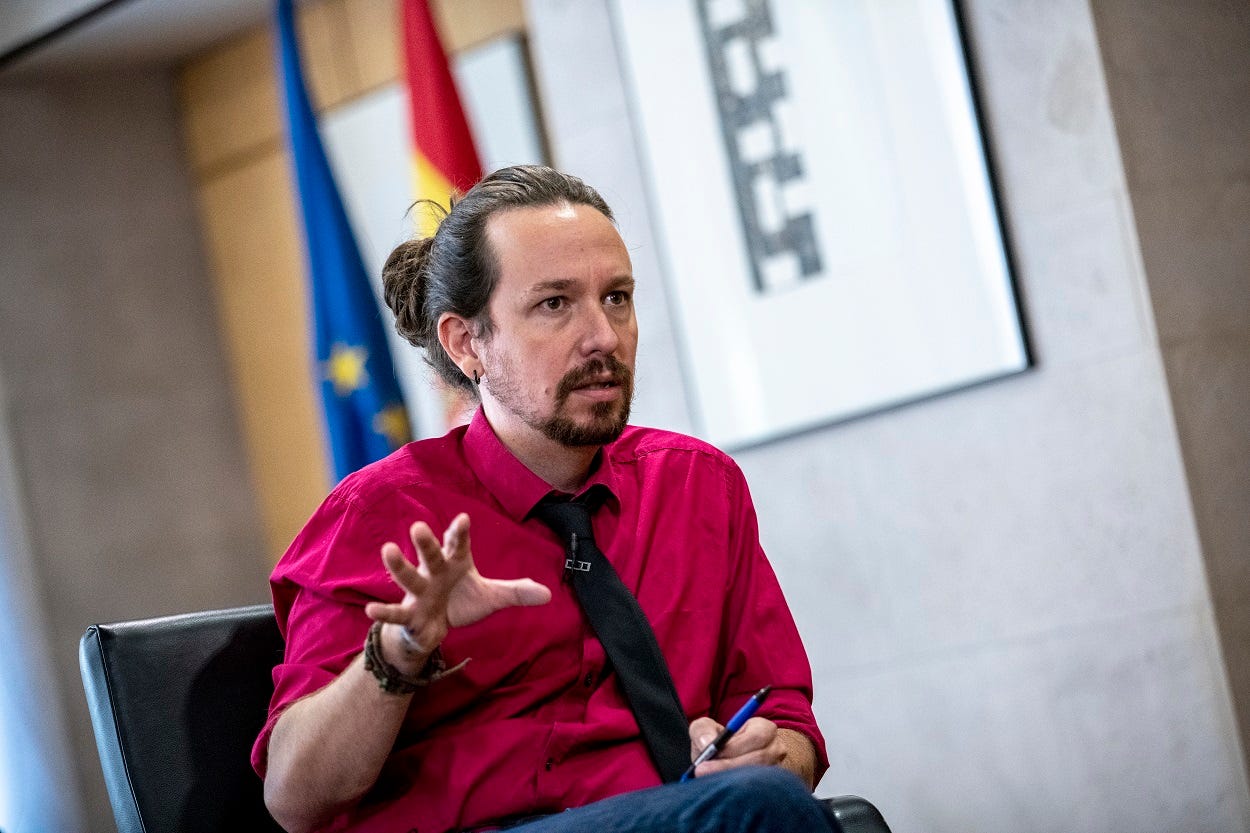Eduardo Inda and Pablo Iglesias: Bound By Hatred
The rivalry between a right-wing journalist and left-wing government minister has spilt into the courts, with each accused of going to illegal lengths to bring down the other.


‘I will not let this mob destroy my country,’ declared Eduardo Inda, editor of news website OkDiario, in an interview with the conservative El Toro TV in early March. The mob he was referring to was Podemos, a left-wing populist party which currently governs Spain with the PSOE - the larger, older and milder socialist party. This was bold, fighting talk from Inda; a man who styles himself as the defender of the Spanish people against the morally debased socialism and feminism of the Left. Months later, Inda is being investigated for stalking children.

Above: In happier times; Eduardo Inda
With his white hair and unstylish dress sense, Eduardo Inda looks beyond his 53 years; more like a man you’d see surrounded by stacks of paper in an accountant’s office than running an online news website. Before founding OkDiario, Inda had a long career at El Mundo, one of Spain’s largest newspapers, before leaving to become chief at Marca; the sports paper which has long enjoyed the title of Spain’s most popular daily publication. During Inda’s four-year reign Marca became known for sensationalism and personal bias against players and managers which Inda disliked, such as Manuel Pellegrini, whose Real Madrid career was cut short after a string of attacks from Marca.

Above: a typical Marca attack on Pellegrini: ‘Get Out Now! Pellegrini guides Madrid to a historic embarrassment against a team from the third division’
After a controversial four years at Marca, Inda returned to El Mundo, before leaving and founding OkDiario in 2015. Using the tagline ‘El sitio de los incomformistas’ (The site of the nonconformists) - ‘nonconformist’ always a bit of a red flag nowadays - OkDiario is known as Spain’s best source of yellow journalism and is the country’s least-trusted news publication. Most stories on OkDiario are either barely true or wild exaggerations of more mundane facts. As was the case with Marca, OkDiario tends to focus its output on Inda’s pet issues - the scourge of socialism, feminism, and the independence movements in Catalonia and the Basque Country- rather than the stories most relevant to Spanish daily life. Inda has also made a name for himself on Spanish radio and television’s many Tertulias; lively debate and discussion programmes in which the participants tend to become more wound up and angry the more trivial the topic is.
Inda and his website take particular issue with the leader of Podemos and current Deputy Prime Minister Pablo Iglesias. Pablo Iglesias has led Podemos since its inception in 2014. The party emerged from Spain’s anti-austerity protests in the early 2010s, part of a wave of protests across Europe against the injustices of the economic crisis, taking inspiration from left-wing Latin American leaders like Bolivia’s recently-deposed Evo Morales and Venezuela’s Hugo Chavez. Among its ambitions were the introduction of a basic income, implementing tough measures against tax avoidance, cutting fossil fuel consumption, promoting gender equality and replacing Spain’s monarchy with a republic. To achieve these aims, Podemos, like other populist parties, actively sought to break with modern political conventions - their branding tended to look more like that of an indie band than a political party, their rallies were chaotic and loud, and their leader, Iglesias, has a beard and ponytail.

Above: An early Podemos demonstration in central Madrid
Inevitably, Podemos has settled down over the years. The excitement has dissipated a little; they are no longer strange or new. While it’s a great success to have got into government and implemented some of their manifesto, they are there as the junior partner to the PSOE, and have had to learn to compromise. Pablo Iglesias has arguably become as much of a political game-player as the stale old politicians his party wanted to replace, and just as isolated from the Spanish people; holed up in his €600,000 villa in Galapagar, a wealthy town outside Madrid. There were days when some expected him to be the next Prime Minister, but since their electoral high point in 2016, when they won 21% of the vote and nearly overtook the PSOE, their support has declined. Now their deputies make up only 10% of the Spanish Congress.

Above: Pablo Iglesias, now Spain’s Second Deputy Prime Minister
You wouldn’t know that from reading OkDiaro though. Most days, the website’s front page displays an obsession with outing Podemos politicians as enemies of the state. It is plastered with sensational stories concerning the minutiae of the lives of Podemos politicians, and ‘investigations’ into supposed financial irregularities such as being funded by Iran and Venezuela; a theme the website has pursued without success for years, with the help of faked police reports, and continues to do so despite the party having being cleared of any wrongdoing by Spain’s highest court.
Frustrated with this failure, Inda has, it seems, turned to other methods to dig up dirt on Podemos and Iglesias. Iglesias has two children with his wife, Irene Montero, who is a Spanish political heavyweight in her own right and currently serves as the Minister for Equality. She had twins a couple of years ago, and added a third child last year. Iglesias and Montero used a private childminder to take care of their children while they continued to work.
In December last year, the couple filed a complaint with the courts against Inda regarding a crime against the liberty of their children. At the end of September, the judge upheld the complaint and ordered that it be investigated. According to the order, a journalist from OkDiario, Alejandro Entrambasaguas, at Inda’s request, had appeared on multiple occasions at the residence of the childminder with the intention of obtaining information about the children and their activities. This resulted in the carer restricting the children’s outings, presumably out of fear for their safety. The order also details how the journalist called the house on multiple occasions, being rebuffed on each of them, and, when that failed, attempted to extract information from neighbours. The carer ended up terminating her contract with Iglesias and Montero.

Above: OkDiario journalist Alejandro Entrambasaguas
At the same time, another judge last week requested that Pablo Iglesias be investigated in connection with the theft of a colleague’s phone. According to the judge, Iglesias came into possession of the phone’s memory card in 2016 and withheld it from its owner, Dina Bousselham - his advisor at the time - because he found material on it which compromised him. In the meantime, OkDiario published material from the card which it had obtained through a different source. It showed Iglesias making misogynistic comments in a group chat. Iglesias then, according to the judge, attempted to use Podemos’ legal team to connect OkDiario with the original theft of the phone, in order to gain political advantage. The judge is now accusing him of filing a false crime report. Iglesias later returned the memory card to Dina, but it had, suspiciously, become inoperable.
In the interview with El Toro TV, Inda refers to Iglesias as a totalitarian and authoritarian, in response to Iglesias saying days earlier that Spain would be a better place with people like Inda in jail. Of course, Inda said the same about Iglesias. Iglesias had said what he said in reference to Inda’s alleged collusion with José Manuel Villarejo, a retired police commissioner accused of spying on Podemos - an affair I think I’ll get into in another issue of this newsletter (OkDiario may have received the material from Dina’s phone through Villarejo). Exchanges like these demonstrate how Podemos and OkDiario feed off eachother. There would be no OkDiario without the trendy left-wingers of Podemos and pompous Catalan independence supporters to rage about; and without OkDiario and people like Inda, Podemos wouldn’t have such rich material with which to motivate their voters. Spain is already a divided country, and Podemos and OkDiario both widen that divide. Right-wing voters have been radicalised by OkDiario into voting for Vox (a new far-right party doing its best to restart the civil war), while left-wingers and independence supporters have, encouraged by their parties, become more entrenched in their positions than before. Time will tell how far each side is prepared to go; Iglesias and Inda may one day end up sharing a cell.
Thanks for reading today! I love hearing from people with recommendations or requests for things I could write about, so feel free to reply to this email! You can also follow me on Twitter. If you enjoyed this email, and think someone else would too, hit the button below to share it.


